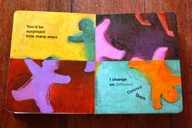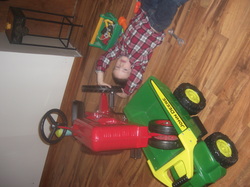
Dr. Seuss had it right when he said that "you'd be surprised how many ways I change on different colored days". Other slogans adopted by the offspring in my domestic nest include: 'whatever floats your boat', 'take it or leave it', and 'ready or not, here i come'. In lieu of a completely disastrous day followed by a rockin awesome day (obviously stemming from Fischer's behavior, mood, and inclinations), I've felt the urge to purge my thoughts on the difference between an awesome day verses a catastrophic day in our world. (NOTE: You may sense a tremor of a facetious tone, but mostly, I'm SO not kidding.)
An awesome day begins with a smile, hug, and "good morning mommy" before the demands for milk, tv, and breakfast begin.
A catastrophic day begins with "mom, gimmie milk and tv."
A- I only have to reheat my coffee 3 times AND I make it through an entire day without self-medicating or busting out the olive juice and shaker.
C- I am still reheating my initial cup of java at 3 in the afternoon, and I most definitely do not make it through the day without self-medicating and calling the spouse midday to remind him that I need more olive juice.
A- Fish plays independently most of the day, and I have to ask him if he wants me to play. (NOTE: I still have to play the shit roles.)
C- Fish whines All. Day. Long. No desire to play on his own. Hangs all over me, and follows me around as though boredom is going to wreck his life.
A- He tells the general public that his butt is scratchy and his pants hurt his wiener.
C- He can't control his disgust and frustration and drops the "F-bomb" in the store.
A- I only have to resort to bribery twice, dolling out 1 sucker and 1 pack of fruit snacks.
C- Bribery and threats are the name of the game. No amount of sweets or taking away of toys will matter.
A- Fischer let's me know before he exits the bathroom that he needs me to wipe his butt.
C- It not only escapes his mind to inform me about his number 2 business, but he takes it upon himself to wipe and play inspector gadget. (Have you read Running With Scissors?...if you have, you know what I mean)
A- Fischer only asks the same question 5 or 6 times over the course of the day.
C- Fischer obsesses constantly over an upcoming event; he might ask the same question 40+ times throughout the course of the day. (This obsessive, anxiety ridden behavior has improved 100% since starting OT and only seems to surface when he gets very out-of-sync.)
A- Impulse control is in tact, and I only have to make minor adjustments like: replace batteries, rearrange bookshelves, put away 20 dvd's, 409 the spaghetti stains out of the carpet, sweep up his oatmeal construction site, and rewash the dishes that he "washed" with lavender oil.
C- Umm...where to begin? Fischer's imagination and creativity with play dough trickles all over the house. A blob of red play dough winds up inside the dvd player because he thought it might make the skipping cease. Little balls of blue play dough speckled throughout the living room floor, which is necessary if the jolly roger is going to set sail. (I won't find what he did with the yellow play dough until next week.) 75 (not kidding) books piled on my bed because it is his library. Red marker to remove off the freshly painted white walls (what was I thinking?). All knobs removed from his sister's dresser (Kevin can deal with that shit.) Remove broken crayons and hi-ho-cherries from his shotgun...both are actually quite creative substitutes for bullets. And, I only have to buy a new box of crayons twice a week.
A- Fischer spills his milk down the crevice of the couch and tells me that it was an accident. (Seriously, it is THE cutest thing when he tells me something is an accident!)
C- I am summoned to the living room to look at his new-and-improved pirate ship, (his $80 pirate ship) and it's slashed sails and flags (with scissors); Fish asks if it was an accident.
A- Fish only drinks half my coffee. Coffee is like toilet paper, it's not meant to be shared. Since I can't self-medicate every day, I rely on coffee way too much to share even a drop.
C- He snakes my coffee in the am, stashes it away, and pulls it out an hour before bedtime and downs the entire thing. He's like his mamma when it comes to coffee; if it means going without, he'll drink his coffee cold.
Awesome- There isn't a toddler out there who is as dynamic, unique, and funny as mine. He is a completely different kid today than he was a year ago and has made progress beyond belief. He tells Kevin and I at least 12 times a day that he loves us. He tells me that I am beautiful. His imagination and pretend play is so deep and complex that I'm too simple-minded for him at times. At times, he can play independently for over an hour. He has worked so hard to reprogram his brain and has developed so many coping mechanisms that you don't notice that he's not a normal, smart tot.
Catastrophic- Even on bad days, he still tells Kevin and I that he loves us and wants to be held and loved on. Tough days serve to remind me how much "noise" he has to deal with to present like other kids. On these days, I think that as difficult as it can be at times to parent a toddler with SPD (or a toddler in general), imagine how difficult it must be to be that toddler who isn't in control.
An awesome day begins with a smile, hug, and "good morning mommy" before the demands for milk, tv, and breakfast begin.
A catastrophic day begins with "mom, gimmie milk and tv."
A- I only have to reheat my coffee 3 times AND I make it through an entire day without self-medicating or busting out the olive juice and shaker.
C- I am still reheating my initial cup of java at 3 in the afternoon, and I most definitely do not make it through the day without self-medicating and calling the spouse midday to remind him that I need more olive juice.
A- Fish plays independently most of the day, and I have to ask him if he wants me to play. (NOTE: I still have to play the shit roles.)
C- Fish whines All. Day. Long. No desire to play on his own. Hangs all over me, and follows me around as though boredom is going to wreck his life.
A- He tells the general public that his butt is scratchy and his pants hurt his wiener.
C- He can't control his disgust and frustration and drops the "F-bomb" in the store.
A- I only have to resort to bribery twice, dolling out 1 sucker and 1 pack of fruit snacks.
C- Bribery and threats are the name of the game. No amount of sweets or taking away of toys will matter.
A- Fischer let's me know before he exits the bathroom that he needs me to wipe his butt.
C- It not only escapes his mind to inform me about his number 2 business, but he takes it upon himself to wipe and play inspector gadget. (Have you read Running With Scissors?...if you have, you know what I mean)
A- Fischer only asks the same question 5 or 6 times over the course of the day.
C- Fischer obsesses constantly over an upcoming event; he might ask the same question 40+ times throughout the course of the day. (This obsessive, anxiety ridden behavior has improved 100% since starting OT and only seems to surface when he gets very out-of-sync.)
A- Impulse control is in tact, and I only have to make minor adjustments like: replace batteries, rearrange bookshelves, put away 20 dvd's, 409 the spaghetti stains out of the carpet, sweep up his oatmeal construction site, and rewash the dishes that he "washed" with lavender oil.
C- Umm...where to begin? Fischer's imagination and creativity with play dough trickles all over the house. A blob of red play dough winds up inside the dvd player because he thought it might make the skipping cease. Little balls of blue play dough speckled throughout the living room floor, which is necessary if the jolly roger is going to set sail. (I won't find what he did with the yellow play dough until next week.) 75 (not kidding) books piled on my bed because it is his library. Red marker to remove off the freshly painted white walls (what was I thinking?). All knobs removed from his sister's dresser (Kevin can deal with that shit.) Remove broken crayons and hi-ho-cherries from his shotgun...both are actually quite creative substitutes for bullets. And, I only have to buy a new box of crayons twice a week.
A- Fischer spills his milk down the crevice of the couch and tells me that it was an accident. (Seriously, it is THE cutest thing when he tells me something is an accident!)
C- I am summoned to the living room to look at his new-and-improved pirate ship, (his $80 pirate ship) and it's slashed sails and flags (with scissors); Fish asks if it was an accident.
A- Fish only drinks half my coffee. Coffee is like toilet paper, it's not meant to be shared. Since I can't self-medicate every day, I rely on coffee way too much to share even a drop.
C- He snakes my coffee in the am, stashes it away, and pulls it out an hour before bedtime and downs the entire thing. He's like his mamma when it comes to coffee; if it means going without, he'll drink his coffee cold.
Awesome- There isn't a toddler out there who is as dynamic, unique, and funny as mine. He is a completely different kid today than he was a year ago and has made progress beyond belief. He tells Kevin and I at least 12 times a day that he loves us. He tells me that I am beautiful. His imagination and pretend play is so deep and complex that I'm too simple-minded for him at times. At times, he can play independently for over an hour. He has worked so hard to reprogram his brain and has developed so many coping mechanisms that you don't notice that he's not a normal, smart tot.
Catastrophic- Even on bad days, he still tells Kevin and I that he loves us and wants to be held and loved on. Tough days serve to remind me how much "noise" he has to deal with to present like other kids. On these days, I think that as difficult as it can be at times to parent a toddler with SPD (or a toddler in general), imagine how difficult it must be to be that toddler who isn't in control.

 RSS Feed
RSS Feed